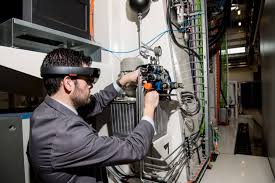The Impact of Production Technology on Modern Industries
Production technology plays a crucial role in shaping the efficiency, quality, and competitiveness of modern industries. With advancements in automation, robotics, artificial intelligence, and data analytics, the way goods are manufactured has undergone a significant transformation in recent years.
One of the key benefits of production technology is increased efficiency. Automated processes can perform tasks with precision and speed that surpass human capabilities. This not only reduces production time but also minimises errors and waste, leading to cost savings for companies.
Moreover, production technology enables industries to enhance product quality. By implementing advanced machinery and monitoring systems, manufacturers can ensure consistency in output and detect defects early in the production process. This results in higher-quality products that meet customer expectations.
Another advantage of production technology is improved flexibility. Modern manufacturing systems are designed to be adaptable to changing demands and customisation requirements. This flexibility allows companies to respond quickly to market trends and produce a diverse range of products efficiently.
Furthermore, the integration of data analytics and artificial intelligence in production technology has revolutionised decision-making processes. By analysing real-time data from the manufacturing floor, companies can identify inefficiencies, predict maintenance needs, and optimise resource allocation for better overall performance.
In conclusion, production technology has become an indispensable asset for modern industries looking to stay competitive in today’s fast-paced market environment. By embracing technological advancements and investing in innovation, companies can streamline their operations, improve product quality, and drive growth in the ever-evolving landscape of manufacturing.
Enhancing Production Efficiency: Six Essential Tips for Optimising Technology in Manufacturing
- Regularly maintain and calibrate production equipment to ensure optimal performance.
- Implement automation where possible to increase efficiency and reduce manual labour.
- Train employees on the latest production technologies to improve their skills and productivity.
- Monitor production processes closely to identify areas for improvement and optimisation.
- Utilise data analytics to track key performance indicators and make informed decisions for process enhancement.
- Stay updated on emerging technologies in the field of production to remain competitive in the market.
Regularly maintain and calibrate production equipment to ensure optimal performance.
Regular maintenance and calibration of production equipment are essential practices to uphold optimal performance in manufacturing processes. By adhering to a routine maintenance schedule and conducting regular calibrations, companies can prevent unexpected breakdowns, minimise downtime, and prolong the lifespan of their machinery. This proactive approach not only enhances the efficiency and accuracy of production operations but also contributes to cost savings in the long run by avoiding costly repairs and replacements. Prioritising the upkeep of production equipment is a strategic investment that ensures consistent output quality and operational reliability in today’s competitive industrial landscape.
Implement automation where possible to increase efficiency and reduce manual labour.
Implementing automation where possible is a key strategy in leveraging production technology to enhance efficiency and minimise manual labour in manufacturing processes. By automating repetitive tasks and streamlining operations through advanced machinery and robotics, companies can significantly boost productivity, reduce human error, and allocate resources more effectively. This not only speeds up production cycles but also allows workers to focus on more complex tasks that require human ingenuity and problem-solving skills. Embracing automation in production technology is a proactive step towards optimising workflows and achieving sustainable growth in today’s competitive industrial landscape.
Train employees on the latest production technologies to improve their skills and productivity.
To enhance efficiency and productivity in manufacturing processes, it is essential to provide employees with training on the latest production technologies. By equipping them with the necessary skills and knowledge, employees can adapt to new tools and systems more effectively, leading to improved performance and output quality. Investing in continuous training not only benefits individual skill development but also contributes to the overall success of the company by ensuring that employees are proficient in utilising cutting-edge technologies to drive innovation and competitiveness.
Monitor production processes closely to identify areas for improvement and optimisation.
To maximise efficiency and quality in manufacturing, it is essential to closely monitor production processes to pinpoint areas for enhancement and optimisation. By keeping a watchful eye on every stage of production, companies can identify bottlenecks, inefficiencies, or potential issues that may be hindering overall performance. This proactive approach allows businesses to make informed decisions, implement targeted improvements, and ultimately streamline their operations for greater productivity and competitiveness in the market.
Utilise data analytics to track key performance indicators and make informed decisions for process enhancement.
By utilising data analytics to track key performance indicators, industries can make informed decisions that drive process enhancement and efficiency. By analysing relevant data points, companies can identify trends, pinpoint areas for improvement, and implement strategic changes to optimise their production processes. This data-driven approach empowers decision-makers to proactively address bottlenecks, reduce waste, and streamline operations for better overall performance. Embracing data analytics as a tool for monitoring and decision-making enables industries to stay agile, competitive, and responsive to the dynamic demands of the modern market landscape.
Stay updated on emerging technologies in the field of production to remain competitive in the market.
Staying updated on emerging technologies in the field of production is essential to maintaining a competitive edge in the market. By keeping abreast of the latest advancements in automation, robotics, data analytics, and artificial intelligence, companies can adapt their manufacturing processes to be more efficient, flexible, and responsive to changing market demands. Embracing new technologies not only enhances productivity and quality but also positions businesses as industry leaders poised for long-term success.

